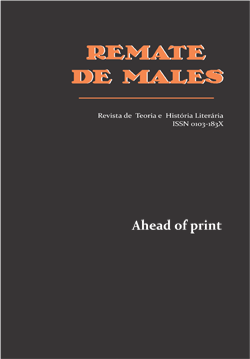Abstract
Authorship, as a historical phenomenon, is built through strategies within and without of the literary text. By becoming theme within the narrative as a gesture in action, the fictional authorship stages the expectations and models in circulation, serving as adjustment or confirmation of certain ideas about literally production. In this article, we will retrieve moments of Brazilian literature in which the narrator is the supposed author and therefore discourses about the process of creating the book we currently read. From the beginning of the twentieth century, we examine Recordações do Escrivão Isaías Caminha (1909), by Lima Barreto, São Bernardo (1934), by Graciliano Ramos, and O Amanuense Belmiro (1937), by Cyro dos Anjos; as a pivotal point for contemporary literature, we examine the novel Em Liberdade (1981), by Silviano Santiago; and, finally, we investigate two novels written by women, Azul e Dura (2002), by Beatriz Bracher, and Nada a Dizer (2010), by Elvira Vigna. Beyond narratives in first person, most of these works bring the shape of the fictional journal, therefore staging the writing gesture related to matters such as sincerity, intimacy and spontaneity.
References
ANJOS, Ciro dos. O amanuense Belmiro. Rio de Janeiro: José Olympio, 1979[1937].
ARTIÈRES, Philippe. Arquivar a própria vida. Arquivos Pessoais. Revista Estudos históricos, Rio de Janeiro, 1998. Disponível em: <https://periodicos.fgv.br/reh/article/view/2061>. Acesso em: jan. 2023.
ASSIS, Machado de. Memórias póstumas de Brás Cubas. In: Obra completa. Vol. 1. Rio de Janeiro: Nova Aguilar, 1992[1981].
BARRETO, Lima. Recordações do escrivão Isaías Caminha. Rio de Janeiro: A. de Azevedo & Costa, 1917[1909].
BRACHER, Beatriz. Azul e dura. São Paulo: Editora 34, 2010[2002].
CARDOSO, Lúcio. Casa da crônica assassinada. São Paulo: Círculo do Livro, 1979[1959].
DIAZ, José-Luis. L’Écrivain imaginaire – Scénographies auctoriales à l’époque romantique. Paris: Honoré Champion, 2007.
HATOUM, Milton. A noite da espera – O lugar mais sombrio 1. São Paulo: Companhia das Letras, 2017.
HATOUM, Milton. Pontos de fuga – O lugar mais sombrio 2. São Paulo: Companhia das Letras, 2019.
HEINICH, N. Être écrivain – creation et identité. Paris: La découverte, 2000.
RANCIÈRE, Jacques. A partilha do sensível: estética e política. Trad. Mônica Costa Neto. São Paulo: Editora 34, 2009.
RAMOS, Graciliano. Caetés. Rio de Janeiro: Livraria Martins Editora, 1965[1933].
RAMOS, Graciliano. São Bernardo. Rio de Janeiro: Record, 1995[1934].
SANTIAGO, Silviano. Em liberdade. Rio de Janeiro: Paz e Terra, 1981.
VIGNA, Elvira. Nada a dizer. São Paulo: Companhia das Letras, 2002.

This work is licensed under a Creative Commons Attribution-NonCommercial 4.0 International License.
Copyright (c) 2023 Creative Commons Licence


